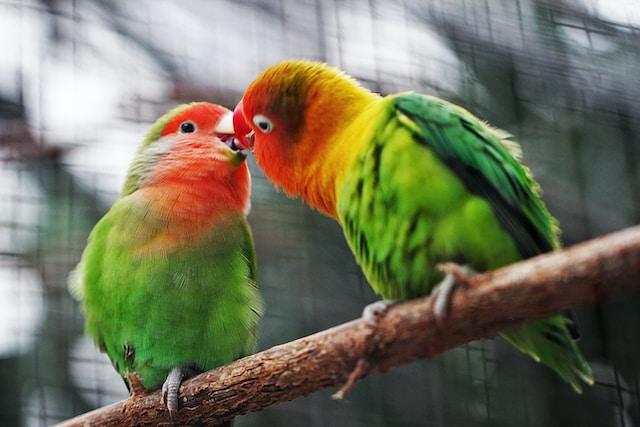Bird keeping has become a popular hobby worldwide because it brings us mental health benefits such as happiness and a connection with the feathered companions they care for.
There are compelling reasons why people find joy in nurturing and maintaining birds as their feathered friends.
One primary reason is the opportunity bird keeping provides to connect with nature. Birds, beautiful creatures that inhabit the wild, bring a sense of nature’s beauty into our lives.
Even for those dwelling in urban areas, caring for birds allows them to experience the wonders of nature, reducing stress and fostering a closer connection with the environment.
Bird keeping is a calming hobby. The soothing sounds, gentle movements, and mere presence of birds around the house create a relaxed atmosphere.
Many find that interacting with birds is an effective way to relieve stress and alleviate anxiety.
Owners often form strong emotional bonds with their feathered companions; these are not just pets but friends that listen, interact, and empower their owners.
Observing a bird’s development over time can be deeply satisfying. Bird keeping also imparts a sense of responsibility and teaches owners valuable lessons about caring for living beings.
Types of Birds Suitable for Keeping: A Guide to Feathery Companions
1. Pigeon
Pigeons are known for their sweet and gentle personalities. Unlike parrots with strong beaks, pigeons rarely bite or harm with their beaks.
You need to equip the drum set with mirrors and swings to enhance operation, and sometimes you need time to fly freely outside the drum to interact.
2. Lovebird
Lovebirds are one of the smallest parrot species. These small, colorful birds are very intelligent. This bird species is well-suited for children living in apartments or condominiums.
Lovebirds have a lifespan of 10 to 20 years, as reported by The Spruce Pets.
3. Budgerigar
Budgerigars, or budgies, are small, colorful birds from Australia that are loved by bird enthusiasts.
These animals are quite tolerant of handling, relatively easy to care for, and can even learn to talk.
They have gentle personalities and often form very strong bonds with their owners, making them good companions for bird lovers.
Budgies have a shorter lifespan, ranging from 7 to 15 years.
3. Quaker Parrot
The Quaker Parrot is actually a small-sized parrot that is relatively easy to care for. In fact, even children who want to have pets can choose the Quaker Parrot as an alternative.
The more words they hear around their cage, the greater the likelihood of understanding and imitating those words. Quaker Parrots have a lifespan of 20 to 30 years.
The Reason Why Keeping Birds Bring Mental Health Benefits

There are many reasons why keeping birds can bring mental health benefits for the pet owner, from being fascinated by their feather colors to the common joy of listening to their soothing chirps. Especially when combined with the serene atmosphere of a garden at home.
Keeping birds is not just a fun hobby but also brings numerous benefits to the owners.
By understanding the advantages, you might become interested in starting bird-keeping. Check out below some benefits of keeping birds:
1. Calming the Mind
Keeping birds brings mental health benefits such as calming the mind and helping alleviate stress. Watching and listening to the sounds of birds can improve mood, making a person feel more relaxed.
Additionally, taking care of birds requires concentration and focus, diverting the mind from everyday problems.
2. Improving Health
Taking care of birds involves physical activities, such as cleaning the cage and feeding the birds. These activities can help improve physical condition and reduce the risk of diseases, such as obesity and heart problems. Watching and listening to bird sounds can enhance mood, aiding in preventing depression and other mental health issues.
Simple activities in bird care also help in concentration, leading to the development of healthy habits.
3. Enhancing Skills and Knowledge
Keeping birds requires an understanding of bird biology, including nutritional needs, care, and habitat. This knowledge ensures that the birds you keep can live healthily, similar to their natural environment.
Moreover, bird-keeping demands skills in caring for animals, such as cleaning the cage, providing food, and monitoring bird health. This fosters a sense of responsibility.
4. Boosting Social Connections
Another advantage of keeping birds is that it can help enhance social connections by introducing you to bird communities. You can provide conversation topics and share experiences and information with others who share the same interest.
This approach can also improve your relationships with friends and family who are interested in birds, fostering positive togetherness.
5. Improving the Economy
Keeping birds can contribute to the local economy by stimulating businesses like bird shops, bird food suppliers, and bird care services. It can also boost personal finances by providing a new source of income through bird sales or offering bird care services.
Additionally, it helps alleviate economic burdens by providing an affordable hobby that reduces stress and enhances the quality of life, potentially lowering healthcare costs.
These are some of the mental health benefits of keeping birds. Bird keeping is also a social hobby, with large communities of people sharing similar interests. They gather in bird clubs or online forums to share knowledge, experiences, and bird care tips.
***
This creates opportunities to interact with new people who have similar interests. Keeping birds is a hobby that brings much happiness and benefits to many people.
From connecting with nature to building strong emotional bonds, this hobby offers many positive aspects. For many people, birds are not just pets; they are companions that bring meaning and happiness to daily life.

